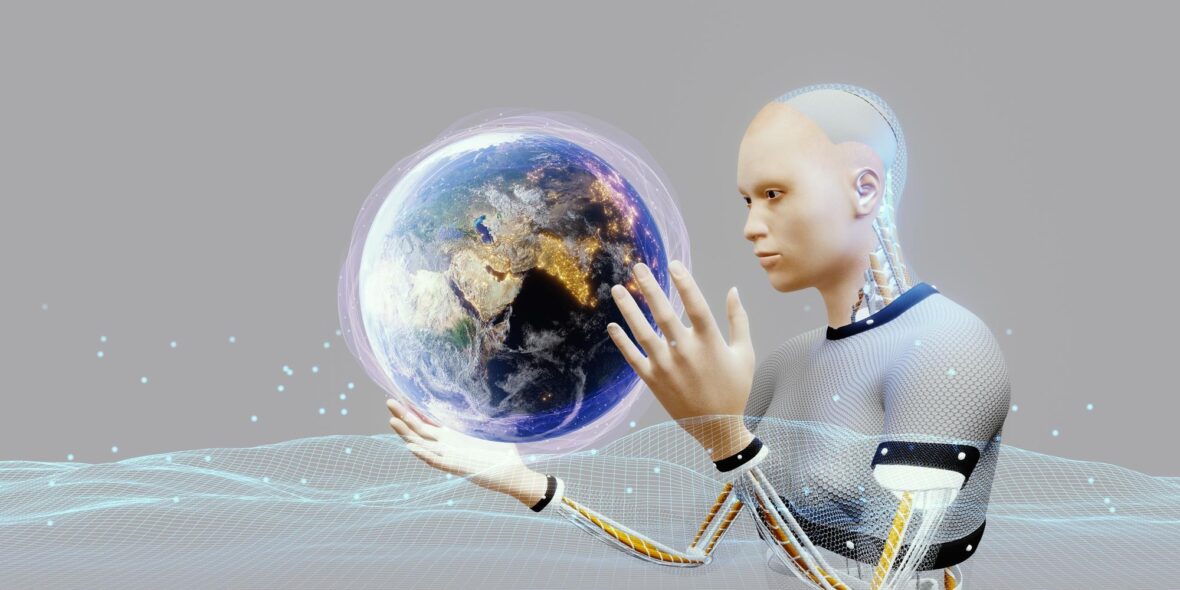Artificial intelligence is exerting a significant worldwide influence across a range of industries and sectors in the current technological era. While its far-reaching impact is already noticeable, there is still considerable potential for further development. AI’s multi-faceted effects on the global economy are vast and wide-ranging.
The Role of Technology in Economic Development
AI possesses the capacity to swiftly scrutinize extensive amounts of data and uncover patterns and trends that may elude humans. This empowers businesses to make better-informed decisions concerning production, marketing, and supply chain management. AI, for instance, can predict changes in demand for goods and automatically adjust production to suit evolving market conditions.
Furthermore, AI technology bears significant implications for the labor market. It may lead to some job displacement that automation can accomplish. But it also has the potential to spawn new employment opportunities in fields such as data science and AI development. As AI continues to advance, new job roles will probably emerge that we cannot even fathom today.
Moreover, AI technology harbors the potential to foster innovation and give rise to novel industries. AI-driven applications in healthcare, for instance, could result in more precise diagnoses and treatments. Additionally, self-driving cars in the transportation industry could overhaul logistics and alleviate traffic congestion. These emerging industries possess the capacity to generate substantial economic value and usher in fresh employment prospects.
Nonetheless, the adoption of AI technology in economic development presents certain challenges. There may be apprehensions regarding data security and privacy, in addition to ethical considerations regarding the use of AI in decision-making. Additionally, further investment in AI research and development is necessary to fully exploit its potential in propelling economic growth.
What is AI?
In simple terms, artificial intelligence is the effort to replicate human intelligence, behavior, and cognitive processes in machines. It aims to make machines capable of performing tasks in the same manner or even better than humans. AI encompasses various sub-fields, with computer vision and machine learning being significant ones. Many fields are adopting Machine learning as it enables machines to learn from humans. It also helps the machines to evolve according to their intended use.
Computer vision is how machines perceive visual information, similar to the way humans do with their eyes. These fields play a crucial role in the growth and learning of AI. The McKinsey Global Institute predicts that by 2030, artificial intelligence has the potential to contribute up to $13 trillion. This is equivalent to 16% of the global economy.
Moreover, AI holds the potential to increase the global GDP by up to 26%. Studies suggest that approximately 70% of businesses may integrate at least one form of AI technology. Examples include machine learning, computer vision, robotic process automation, and virtual assistants in the coming years.
How AI Can Positively Impact the Economy of a Country?
- Translation services provided by AI can address a significant barrier to overseas trade – the lack of effective communication due to language barriers. Accurate translation services offered by AI can eliminate miscommunication and enhance the process of international cooperation, thus facilitating global trade.
- AI-powered tools can assist negotiators in analyzing the economic strategies of their counterparts in different scenarios, enabling them to predict how these strategies could impact the outcome of negotiations. This empowers negotiators to make well-informed decisions and improve the negotiation process.
- Artificial intelligence (AI) can positively impact supply chain management by analyzing data and identifying patterns, allowing for predictions of fluctuations in demand for products. With this information, efficient AI algorithms can automatically adjust production levels to meet demand.
- AI has the potential to significantly increase efficiency and accuracy by automating processes and reducing human errors. This technology can streamline various operations and produce better outcomes while saving time and resources. By supplementing human labor, AI can also perform tasks independently, further increasing efficiency.
- The rise of cryptocurrency as a digital payment method has been remarkable. Unlike physical currency, it has no physical existence, and its growing popularity poses a challenge of adapting to a new economic reality.
- The increasing popularity of autonomous vehicles such as Tesla’s self-driving cars offers an economical option as they consume less fuel and produce less pollution. Running entirely on electricity, these vehicles are more sustainable in the long run, require fewer natural resources, and have a positive impact on the global economy.
- The healthcare industry is set to greatly benefit from the application of AI in medical research, leading to increased efficiency and groundbreaking advancements such as new medicines, technologies, and more, ultimately resulting in reduced costs.
Countries with the Most Capable AI will Benefit the Most
Many countries are considering the possibilities of exponential growth through artificial intelligence. Those countries with the most advanced AI technology could gain a substantial advantage in production and exports, resulting in a significant lead in the global economy.
Reliance on AI and its subsystems, such as machine learning and computer vision, could ensure technology, economic, and military supremacy. Currently, cloud storage is replacing traditional shipping containers and warehouses, and digitized payments are replacing conventional transaction methods.
Artificial Intelligence has achieved significant breakthroughs with far-reaching implications for the economy, including the potential to cure existing and future ailments in the long term. During the COVID-19 pandemic, security became a challenge, and AI played a critical role in addressing it.
AI-powered contactless and wireless technologies were developed, supporting the global economy during one of its most challenging periods. AI has been instrumental in enhancing the global economy and is expected to continue to do so for many years to come.
Final Words
AI-powered chatbots and virtual assistants hold the potential to enhance customer service and augment customer satisfaction, leading to an upsurge in sales and revenue for businesses. This, in turn, can propel economic growth by catalyzing demand for goods and services.
Furthermore, AI can simplify international trade by providing precise translation services and streamlining cross-border communication, mitigating language barriers, and simplifying the process of international cooperation.
So AI can positively influence a country’s economy by improving productivity and efficiency, enhancing decision-making processes, and facilitating international trade while elevating customer service. Therefore, governments and businesses must embrace AI and invest in its development to maximize its benefits and foster economic growth.






